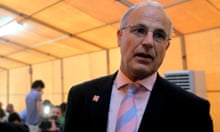The owner of cigarette brands including Lucky Strike, Pall Mall and Camel has posted a near 9% rise in profits, despite lower sales partly caused by the pandemic.
British American Tobacco (BAT) said the number of cigarettes sold fell by almost 5% last year, amid restrictions on travel that hit duty-free trade and and a sales ban in South Africa related to the Covid-19 crisis. However, price increases meant the total value of cigarettes sold rose.
Sales of vaping kits – BAT sells under the Vuse and Vype brands – climbed 52%, with online vape sales up 40% as 17,500 people signed up as regular subscribers to BAT brands.
Jack Bowles, the chief executive, said BAT had 13.5 million consumers of its non-combustible products, up 3 million on last year.
Pre-tax annual profits rose to £8.7bn. Richard Hunter, the head of markets at Interactive Investor, said BAT had navigated a way to a “comfortable profit” thanks to cost savings – which hit £660m last year – together with the strength of its brands and growth in smoking alternatives. However, he said the company needed to keep a close eye on its £40bn of net debt.
The shares, which have more than halved since 2017, fell by almost 5% in morning trading as the City was disappointed by the profit performance.
Hunter said: “The industry is one where, quite apart from changing tastes, the threat of litigation and regulation have been an overhang for some considerable time. Further out is the possibility that investors will eschew the tobacco sector as an investment destination, given the growing popularity of ethical considerations.”
As part of aims to secure £5bn in sales of new products by 2025, the group began testing its first cannabidiol vaping products in Manchester last month.









